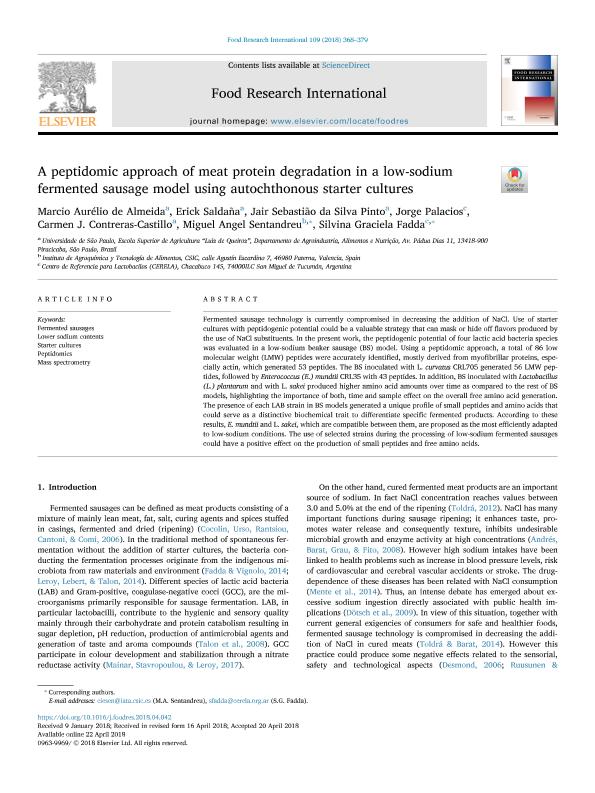Mostrar el registro sencillo del ítem
dc.contributor.author
de Almeida, Marcio Aurélio
dc.contributor.author
Saldaña, Erick
dc.contributor.author
da Silva Pinto, Jair Sebastião
dc.contributor.author
Palacios, Jorge Martin

dc.contributor.author
Contreras-Castillo, Carmen J.
dc.contributor.author
Sentandreu, Miguel Angel
dc.contributor.author
Fadda, Silvina Graciela
dc.date.available
2019-08-12T17:06:49Z
dc.date.issued
2018-07
dc.identifier.citation
de Almeida, Marcio Aurélio; Saldaña, Erick; da Silva Pinto, Jair Sebastião; Palacios, Jorge Martin; Contreras-Castillo, Carmen J.; et al.; A peptidomic approach of meat protein degradation in a low-sodium fermented sausage model using autochthonous starter cultures; Elsevier Science; Food Research International; 109; 7-2018; 368-379
dc.identifier.issn
0963-9969
dc.identifier.uri
http://hdl.handle.net/11336/81436
dc.description.abstract
Fermented sausage technology is currently compromised in decreasing the addition of NaCl. Use of starter cultures with peptidogenic potential could be a valuable strategy that can mask or hide off flavors produced by the use of NaCl substituents. In the present work, the peptidogenic potential of four lactic acid bacteria species was evaluated in a low-sodium beaker sausage (BS) model. Using a peptidomic approach, a total of 86 low molecular weight (LMW) peptides were accurately identified, mostly derived from myofibrillar proteins, especially actin, which generated 53 peptides. The BS inoculated with L. curvatus CRL705 generated 56 LMW peptides, followed by Enterococcus (E.) mundtii CRL35 with 43 peptides. In addition, BS inoculated with Lactobacillus (L.) plantarum and with L. sakei produced higher amino acid amounts over time as compared to the rest of BS models, highlighting the importance of both, time and sample effect on the overall free amino acid generation. The presence of each LAB strain in BS models generated a unique profile of small peptides and amino acids that could serve as a distinctive biochemical trait to differentiate specific fermented products. According to these results, E. mundtii and L. sakei, which are compatible between them, are proposed as the most efficiently adapted to low-sodium conditions. The use of selected strains during the processing of low-sodium fermented sausages could have a positive effect on the production of small peptides and free amino acids.
dc.format
application/pdf
dc.language.iso
eng
dc.publisher
Elsevier Science

dc.rights
info:eu-repo/semantics/openAccess
dc.rights.uri
https://creativecommons.org/licenses/by-nc-sa/2.5/ar/
dc.subject
Fermented Sausages
dc.subject
Lower Sodium Contents
dc.subject
Mass Spectrometry
dc.subject
Peptidomics
dc.subject
Starter Cultures
dc.subject.classification
Bioprocesamiento Tecnológico, Biocatálisis, Fermentación

dc.subject.classification
Biotecnología Industrial

dc.subject.classification
INGENIERÍAS Y TECNOLOGÍAS

dc.title
A peptidomic approach of meat protein degradation in a low-sodium fermented sausage model using autochthonous starter cultures
dc.type
info:eu-repo/semantics/article
dc.type
info:ar-repo/semantics/artículo
dc.type
info:eu-repo/semantics/publishedVersion
dc.date.updated
2019-07-24T18:00:34Z
dc.identifier.eissn
1873-7145
dc.journal.volume
109
dc.journal.pagination
368-379
dc.journal.pais
Canadá

dc.journal.ciudad
Ontario
dc.description.fil
Fil: de Almeida, Marcio Aurélio. Universidade de Sao Paulo; Brasil
dc.description.fil
Fil: Saldaña, Erick. Universidade de Sao Paulo; Brasil
dc.description.fil
Fil: da Silva Pinto, Jair Sebastião. Universidade de Sao Paulo; Brasil
dc.description.fil
Fil: Palacios, Jorge Martin. Consejo Nacional de Investigaciones Científicas y Técnicas. Centro Científico Tecnológico Conicet - Tucumán. Centro de Referencia para Lactobacilos; Argentina. Universidad Nacional de Tucumán. Facultad de Ciencias Naturales e Instituto Miguel Lillo; Argentina
dc.description.fil
Fil: Contreras-Castillo, Carmen J.. Universidade de Sao Paulo; Brasil
dc.description.fil
Fil: Sentandreu, Miguel Angel. Consejo Superior de Investigaciones Científicas. Instituto de Agroquímica y Tecnología de Alimentos; España
dc.description.fil
Fil: Fadda, Silvina Graciela. Consejo Nacional de Investigaciones Científicas y Técnicas. Centro Científico Tecnológico Conicet - Tucumán. Centro de Referencia para Lactobacilos; Argentina
dc.journal.title
Food Research International

dc.relation.alternativeid
info:eu-repo/semantics/altIdentifier/doi/https://dx.doi.org/10.1016/j.foodres.2018.04.042
dc.relation.alternativeid
info:eu-repo/semantics/altIdentifier/url/https://linkinghub.elsevier.com/retrieve/pii/S0963996918303272
Archivos asociados
